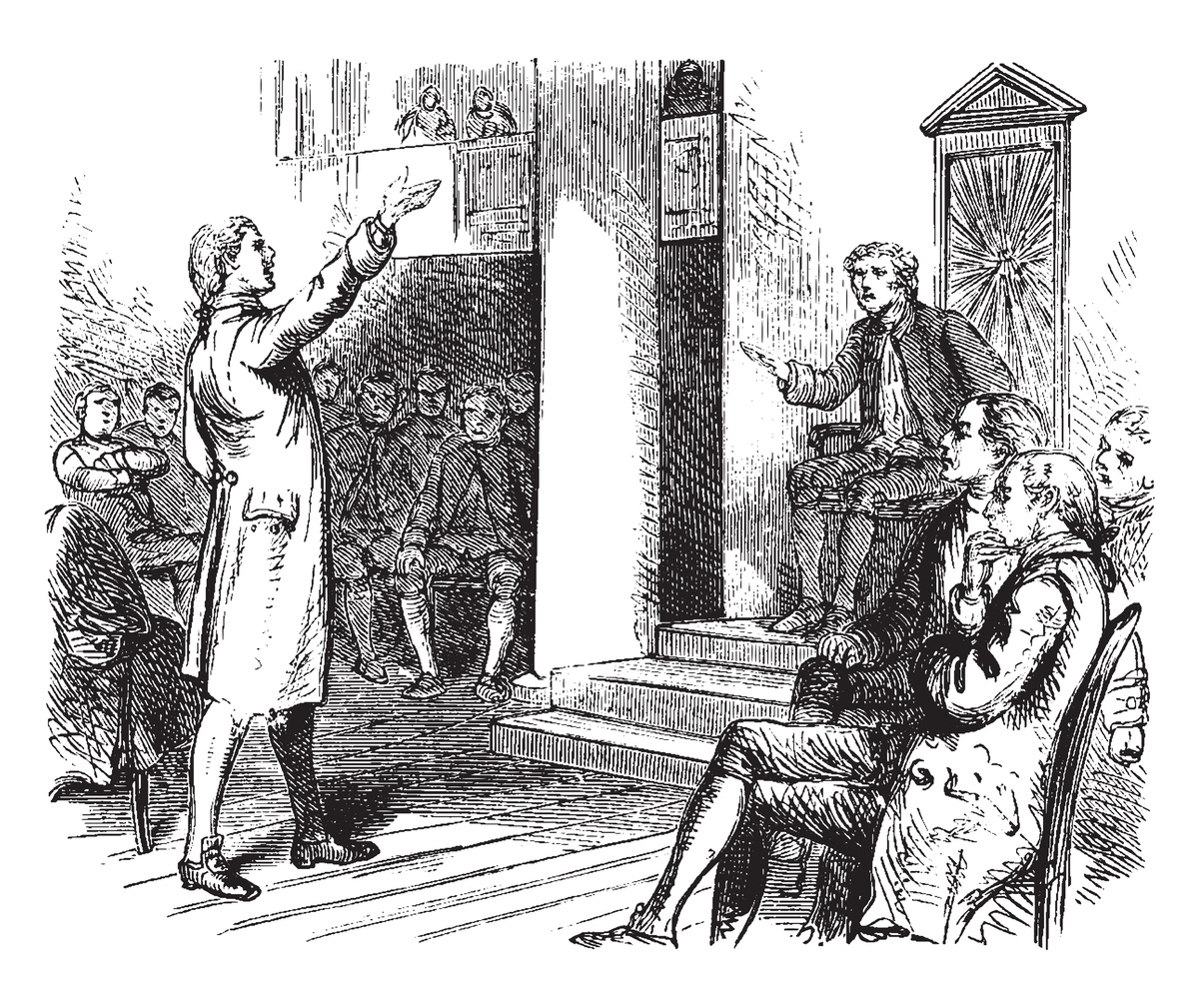
TLDR: Patrick Henry’s “Give Me Liberty or Give Me Death” speech changed the minds of enough Virginians that they had county militias ready to fight when the British attacked. The speech used questions, allusions, opposing ideas, and a huge dose of “revolutionary spirit” to drive home the point that the only way forward for the colonies was to fight for independence.
So What?
The speech became iconic for its expression of the deeply held message that life was not worth living without liberty.
More than a year before the Declaration of Independence was signed (but only a month before the first clash between colonial militiamen and British soldiers that later became known as “the shot heard round the world”), Patrick Henry delivered “the speech heard round the world” to his fellow delegates at the Second Virginia Convention, which included George Washington and Thomas Jefferson.
The speech is well-known for its culminating sentence of, “I know not what course others may take, but as for me, give me liberty or give me death!” His words in this speech were a major factor in Virginia’s decision to start militias in every county to be ready to fight when the time came, and for the resolve of some of the nation’s most influential politicians to go after American independence even though it appeared impossible.
Before Henry’s speech, many of the delegates thought it was hasty at best and suicidal at worst to think about fighting the British military for the colonies’ independence, despite the Crown’s increasing greed and heavy-handedness. After the speech, the delegates voted to prepare for war even when there was a chance of working things out with King George.
Henry’s speech was not just an emotional and passionate oration, however. Before the inspirational crescendo, he carefully laid out the reasons he believed in “liberty or death” in a way that men like Washington and Jefferson couldn’t deny. One thing that made Henry’s speech so powerful was the way he used language and references to other familiar stories that would help make his points.
Set Parameters at the Outset
Henry begins his speech by acknowledging his beliefs were the opposite of many in the room, but that he needed to be able to speak freely. No recording equipment was available to hear what Henry’s speech sounded like at the time, but tradition states he started off calmly and grew in fervor until the end. It also states he was not interrupted or shouted down as he set his parameters right away by asking to speak openly.
Setting the parameters for a speech or conversation at the beginning is important as it lets people know what to expect and how they should conduct themselves. Henry was about to discuss a subject he knew was the source of deep disagreements, and he politely asked to be allowed to speak his mind in a concise and uninterrupted way, which he knew would give him the best chance of convincing his hearers.
Appeal to Powerful Ideas in Juxtaposition
Henry began his speech with two powerful ideas that he juxtaposed to get his listeners to understand what their course of action should be. He said the decision to form militias was “nothing less than a question of freedom or slavery,” with the implication being that the way to freedom would be to fight the British and the way to slavery would be to remain as colonies while the British continued to levy onerous taxes and send soldiers to keep them in line.
The men who accepted Henry’s premise couldn’t do anything but choose freedom over slavery as a good part of the reason most of them came to the colonies was to escape oppression and subjugation. Henry appealed to the American spirit, and the human desire for freedom.
Allusions to the Bible and Mythology
Henry used allusions or references to the Bible, the Judeo-Christian faith, and mythology his listeners would have known and understood. These references were used in a way that they made his points more relatable, thus increasing their power.
One example of an allusion to mythology is when Henry says, “We are apt to shut our eyes against a painful truth, and listen to the song of that siren till she transforms us into beasts.” This reference to the mythological sirens warns the audience about the dangers of ignoring the truth because another story is more palatable.

Henry follows that allusion with a nod to the Bible: “Are we disposed to be of the number of those who, having eyes, see not, and, having ears, hear not, the things which so nearly concern their temporal salvation?” This is a reference to Matthew 13:13: “Therefore speak I to them in parables: because they seeing see not; and hearing they hear not, neither do they understand.”
The combination of these two allusions is a powerful admonition for listeners to face the truth of their situation rather than vainly hope the British will simply stop the oppression of the colonists.
Ask Rhetorical and Logical Questions
Another effective technique Henry uses in his speech comes in the middle when he asks a series of questions (some rhetorical) like:
- I wish to know what there has been in the conduct of the British ministry for the last ten years to justify those hopes with which gentlemen have been pleased to solace themselves and the House.
- Are fleets and armies necessary to a work of love and reconciliation?
- Have we shown ourselves so unwilling to be reconciled that force must be called in to win back our love?
- I ask gentlemen, sir, what means this martial array, if its purpose be not to force us to submission? Can gentlemen assign any other possible motive for it?
- What terms shall we find which have not been already exhausted?
Lastly, he asks, “Is life so dear, or peace so sweet, as to be purchased at the price of chains and slavery?”
Questions have several effects on your listeners. They keep listeners engaged and hold their interest. Questions encourage them to think through the argument, leading them to a conclusion. All these results combine in Henry’s speech to make his conclusion unmistakable.
He didn’t convince all his hearers, but he did get them to pass his militia act, which became very important a month later when the battle at Lexington and Concord launched the Revolution.
Thomas Jefferson later credited Henry with ushering in a spirit of revolution that spurred the fledgling government on in its efforts to achieve independence. “It is not now easy to say what we should have done without Patrick Henry,” Jefferson wrote. “He was before us all in maintaining the spirit of the Revolution.”
A Lasting Effect
Henry’s speech became famous and has been used by other oppressed colonies and peoples as they fought for their independence, even in India and Australia. The drive to achieve freedom has been strong through the centuries. It can be applied to your communication as well.
If you’re looking for better communication in your marketing materials, we’re the world experts. To find out how much revenue you can be making with our services, download our Content Marketing Calculator.
